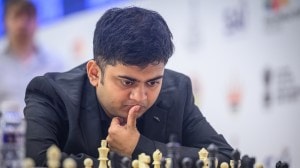Former Indian Navy captain seeks US Justice Dept help in son’s case
In an urgent plea for help, the 67-year-old former Indian Navy captain Dr Buddhikota Subbarao, who has been fighting a lone legal battle for his son Vikram Buddhi...

In an urgent plea for help, the 67-year-old former Indian Navy captain Dr Buddhikota Subbarao, who has been fighting a lone legal battle for his son Vikram Buddhi, who was arrested in the Unites States over two years ago for allegedly sending threat mails to President George Bush, has sought an intervention from the US Department of Justice, through a letter written to US Attorney General Michael B Mukasey.
In his letter, dated October 21 and sent by email as well as through regular post, Subbarao has made a request that his son Vikram’s case be taken up suo-motu by the Department of Justice, to redress the “discrimination against a citizen from India”.
Vikram, a Navi Mumbai resident who went to study applied mathematics at Purdue University, was arrested on April 14, 2006, and charged on 11 counts including charges under US Code 871 that deals with threats to the US president and his successor. If proved guilty, he could be sentenced to imprisonment up to 60 years.
Subbarao’s letter explains Vikram’s case with a sequence of events leading up to the arrest. The letter also describes the grand jury system in the United States as “primitive, unfair and shockingly inadequate”.
It says while the messages calling for revenge against President Bush and others appeared on the Internet in December 2005 and January 2006, US Secret Service Agents found Purdue University to be the origin of the messages and also found a “possibility of IP spoofing” and “hacking” as well as a history of the university’s computer networks having been hacked into.
The Secret Service freed Vikram after questioning him on January 18, 2006, before re-arresting him four months later.
Comparing Vikram’s case with that of US citizen Ken Haywood who fled India even when a look out notice was pending against him while he was under investigation in the matter of threat e-mails traced to his computer, Subbarao says the difference is that Vikram boldly remained in the United States to face the law.
“The discrimination against the Indian Graduate student has kept justice out of his reach. It is this discrimination against an Indian and the unfair trial he faced in the United States that requires examination by the US Department of Justice and the US Congress,” the letter says.



- 01
- 02
- 03
- 04
- 05




























